As the 162nd Jayanti (birth anniversary) of Swami Vivekananda approaches, we are reminded of the countless instances of his young life where he braved all odds for his dharma, his matribhu (motherland) and his guru.
During his return from England to Bharat via sea route, when he encountered a Christian missionary spitting venom against Hindu practices, an enraged Swamiji grabbed him by his collar, reprimanded him for his poisonous remarks, and threatened to throw him in the sea if he spoke ill of Hindutva again. As noted historian Sitaram Goel puts it, “Vivekananda himself symbolised an irony of that system of education which had been deliberately designed to demolish Hinduism and promote Christianity. He was himself a product of that very education, but he turned against Christianity and in defense of Hinduism in the knowledge and intellectual discipline which he had acquired as a student in a missionary college.” Despite coming from this background, with clear perspective and experience, Swamiji’s rise to become the champion defender of Hinduism in the debates of 1893 Parliament of Religions is jaw dropping.
Alexander Duff, an ardent advocate of western education, reached Calcutta in 1830. He was convinced that “of all the systems of false religion ever fabricated by the perverse ingenuity of fallen men, Hinduism is surely the most 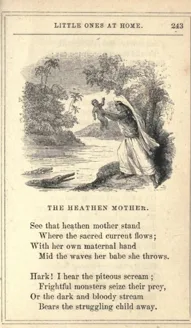 stupendous” and that Bharat was “the chief seat of Satan’s earthly dominion.” He carefully studied the effect that western education was having on young Hindu minds and came to a definite conclusion that this education would make the Hindus “perfect unbelievers in their own system” and “perfect believers in Christianity.” He delivered an address in 1835 to a general Church Assembly where he proclaimed that knowledge of western literature and science would “demolish the huge and hideous fabric of Hinduism” brick by brick till “the whole will be found to have crumbled into fragments.”
stupendous” and that Bharat was “the chief seat of Satan’s earthly dominion.” He carefully studied the effect that western education was having on young Hindu minds and came to a definite conclusion that this education would make the Hindus “perfect unbelievers in their own system” and “perfect believers in Christianity.” He delivered an address in 1835 to a general Church Assembly where he proclaimed that knowledge of western literature and science would “demolish the huge and hideous fabric of Hinduism” brick by brick till “the whole will be found to have crumbled into fragments.”
The disdain westerners like Duff, Macaulay and several others like him had for Hinduness is clearly evident from the way they depicted and narrated misconceptions about it in their writings at home. Their offensive and derogatory portrayals of Bharatiyas, Hindus in particular, reeked of intense disgust, contempt, and misrepresentations. Such depictions fuelled their need to send evangelical missionaries to Bharat for “harvesting souls of the depraved Heathen (Hindu) lands” that are “in dire need of saving”.
Poems, illustrations, and sermons filled with over-the-top stereotypes became so popular in their diaspora that even poems for little children with these visuals became a Sunday School Lore. Newspapers, Missionary journals were full of stories of Human sacrifice in Bharat. These writings were not factual—they were designed to provoke horror and raise funds for missionary work from ordinary working class Americans. Sensational literature like India and Its Inhabitants (1858) even published engravings of Sagar Island, claiming Hindu mothers sacrificed their babies to crocodiles in the “Ganges”. These false stories spread across Western media and the bias became entrenched in American School Textbooks to this day.
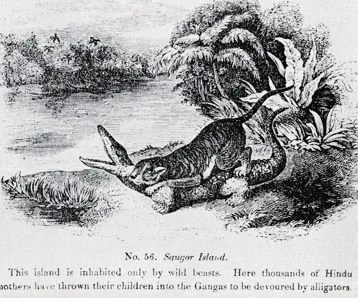
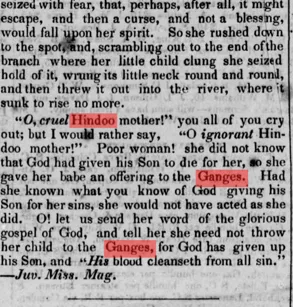
As Vivekananda toured America, these myths had already spread far and wide. While in Los Angeles, a woman asked, “Is it true Swami that Hindoo Mothers feed children to crocodiles in Ganges?” Swamiji, being quick witted as he was, would never get angry, instead amused and always respond with wit and satire, ‘Yes, madam, even I was offered to one, but I escaped!’ In Detroit he was asked why only female babies were “fed” to crocodiles, his response was, ‘Probably because they’re softer and easier to chew.’ Although his humour disarmed ignorance and highlighted the absurdity of such questions, it wasn’t just ignorance—it was deep-seated prejudice.
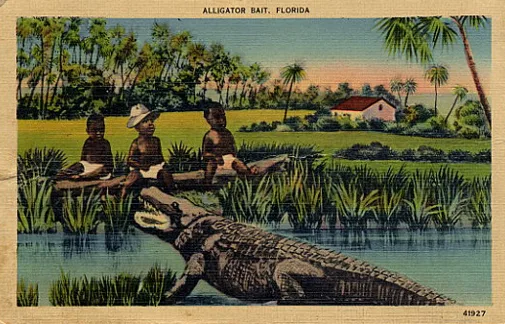
Human sacrifice under the chariot of ‘Juggernaut’ (Jagannath Rath Yatra) and mothers sacrificing babies to crocodiles to appease gods/ demons became so entrenched in American pop culture that journalists commonly referenced ‘Ganges crocodiles’ during the Civil War. Such myths weren’t limited to Bharat. In America, Jim Crow-era postcards depicted African-American children as “alligator bait,” perpetuating dehumanising stereotypes. Their racism has forever been intertwined with such propaganda to justify conversion, colonialism and oppression.
Swami Vivekananda’s sharp wit and spiritual depth allowed him to confront these impressions, biases with utmost grace. Not just the dispelling of myths, he exposed the underlying prejudice and ignorance that sustained them. But why does this matter today? Because stereotypes still shape perceptions. Vivekananda’s journey teaches us to question narratives, confront ignorance.
The constant violent attacks on people coming from outside including Bharatiyas in UK, USA and other foreign countries screams of the deeply entrenched racism in their hearts. Bharatiyas, especially the Hindus, are typically faced with hateful and humiliating racist slurs like ‘you dung eater,’ ‘piss drinkers,’ ‘cow worshipper,’ ‘go back to your third world country,’ ‘does your house have a toilet or does your toilet have a flush?,’ and many such absurd unsettling comments. Statistically, Bharatiyas make the most decent residents/ populace in foreign countries, earning less than deserved and yet, paying more taxes than the average native resident. They are docile, keep to themselves and their small communities, live a respectful life and never engage in creating unrest or nuisance by provocation. They abide the law, follow rules and regulations.
Despite this, the kind of violent, hateful, spiteful attacks by verbal, physical, sexual modes is staggering. The kind of treatment the Bharatiyas receive abroad even today is proof enough of what Swamiji must have faced at that time.
Swamiji’s enduring message in his inaugural speech at Chicago on September 11, 1893 is something the world needs to come to terms with. He says, ours is a country that has “taught the world both tolerance and universal acceptance.” Bharat believes “not only in universal toleration but we accept all religions as true.” As “Each soul is potentially divine,” the west just has to realise the divinity all around, within their own selves and that of the others. Swamiji’s wisdom is as relevant now as ever.


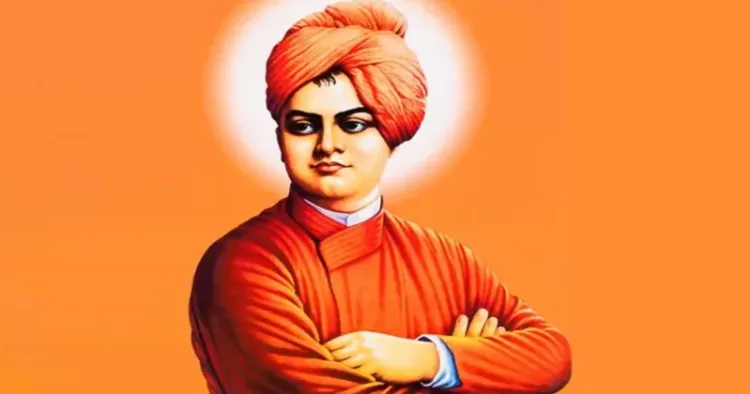

















Comments